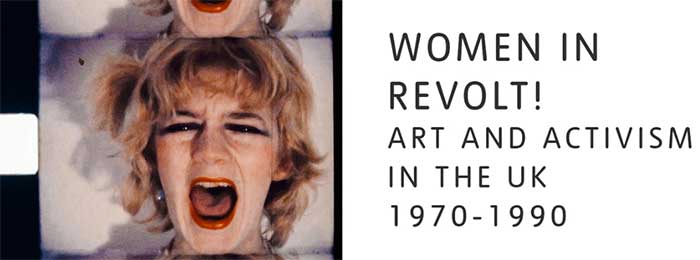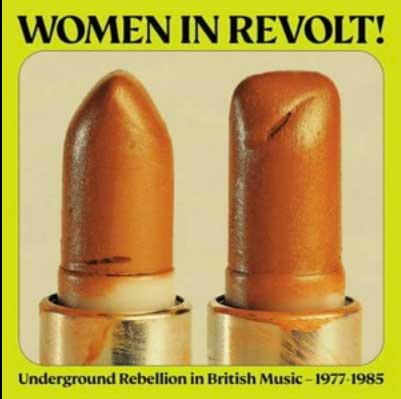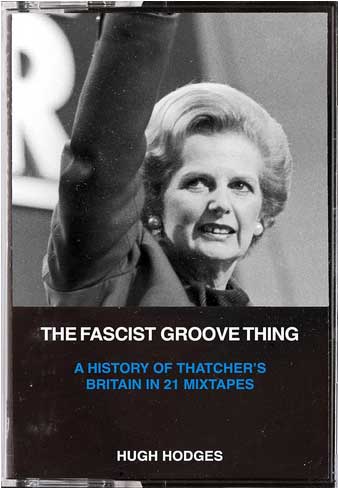
Women In Revolt, Tate Britain
Women in Revolt (CD, Music for Nations)
The Fascist Groove Thing, Hugh Hodge (PM Press)
Is this an art exhibition or a political documentary? Who has the right to question what is or isn’t art? Clearly, men cannot criticise women’s experiences, white criticise black, straight criticise queer. This exhibition is rooted in the personal and the experiential: in places it is witty and provocative, elsewhere it simply tries to capture the momentary actions and politics of yesterday.
Were the Women’s Peace Camps at Greenham Common an artistic event or a political one? I think the latter, albeit a very important one, as are most of what is remembered here. But I am less convinced of it as visual art, it is an archive: of action, badges, magazines, posters, happenings and concerts. The majority of what is exhibited here was not made as or ever intended to be art, it was made as propaganda and provocation, information and slogans, and I think there is something questionable about it all being framed and displayed. It is social history, glimpses of the past, supporting evidence for changes demanded and what happened, or didn’t, as a result.
Much of it is informative and intriguing, some of it slight and some of it somewhat skewed. The Rock Against Racism exhibits seem to try and exclude men from the story, though the documentary considering the then government’s response to AIDS mostly features male talking heads. The recreation of the Greenham Common fence, strung with kitchen implements and children’s clothes is somewhat squeaky clean and unmoving; better are the sections of women’s involvement in squatting, refuges and music, as evidenced on the music compilation which shares the same name as the exhibition.
The album, to be honest, has little that is new or ‘undiscovered’, but it is a nice mix of energetic and sometimes shambolic punk and more gentle stuff. So we get upbeat tracks by The Slits, X-Ray Spex and Essential Logic contrasted with pastoral tunes by The Marine Girls and Strawberry Switchblade, anarcho-punk by The Poison Girls, a herky-jerky Ludus track and Vivienne Goldman’s domestic reggae about her visit to the launderette, just before Chris & Cosey’s deviant synthpop love song, which ends the selection.


Meanwhile, Hugh Hodge’s The Fascist Groove Thing: A History of Thatcher’s Britain in 21 Mixtapes, which I picked up from the Tate bookshop, tells a story with songs as evidence, even when they are unreliable or implausible, and offers little critical judgement of the music discussed. Instead, the book simply states what the tracks are about, how they approach their subject and are a product, celebration or critique of the politics of the time.
So Duran Duran tracks rub shoulders with the most obscure DIY anarcho-punk and indie-rock as Hodges weaves a way through each of his subjects, gathering up songs from a cluster of years. Very little of the music is related to anything specific, although many of Hidge’s choices are songs of resistance and defiance, youthful exuberance, angry shouts and catchy slogans, whatever the musical genre.
Hodges has the sense to realise music has little effect on society and politics (although he seems oblivious to how Rock Against Racism was an important part of defeating the National Front) and that even the most outspoken anti-Thatcherite anthems were mostly a soundtrack to drinking, dancing, sex and concert going. Having said that, he is definitely drawn to the most unsubtle lyrics of bands like The Exploited, perhaps because they offer a straightforward riposte to the banal soundbites and bullshit offered up by Thatcher and her ministers
Strangely, alongside the occasional jibes at Phil Collins and other popstars, which seem totally understandable, Hodges manages to make excuses and apologies for Gary Bushell and the Oi! bands, mostly on grounds of class (which apparently means racism and violence is OK) and also has the usual obsession with posh boy mockney rebels The Clash. He also has an encyclopaedic knowledge of obscure punk and indie music, which he places alongside the chart hits of the day, although that may simply be so he can enjoy satirising the latter. (Which isn’t, of course, a judgment value. Ahem.)
Despite a desire for Hodges to fly his flag and show his political colours, and perhaps do more critical deconstruction and contextualisation – particularly in regard to some of the warmongering rabble-rousing during the Falklands, and the contradictions of supporting the Miners’ demands to carry on with their shit jobs – this is an enjoyable and intriguing book, which through its inclusive and generous musical selections ends up forming an authentic and alternative history of Thatcher’s political rise and fall, as well as the effect it had on a wide spectrum of musicians and performers.
Rupert Loydell
.

I’d agree that the exhibition is a bit flawed in places, but is well intentioned. The CD collection is at best, misguided though and certainly not worth buying. Hodges book sounds off target too. All in all, these all could have been done better I’d say.
Comment by Alan Rider on 3 March, 2024 at 7:55 pm